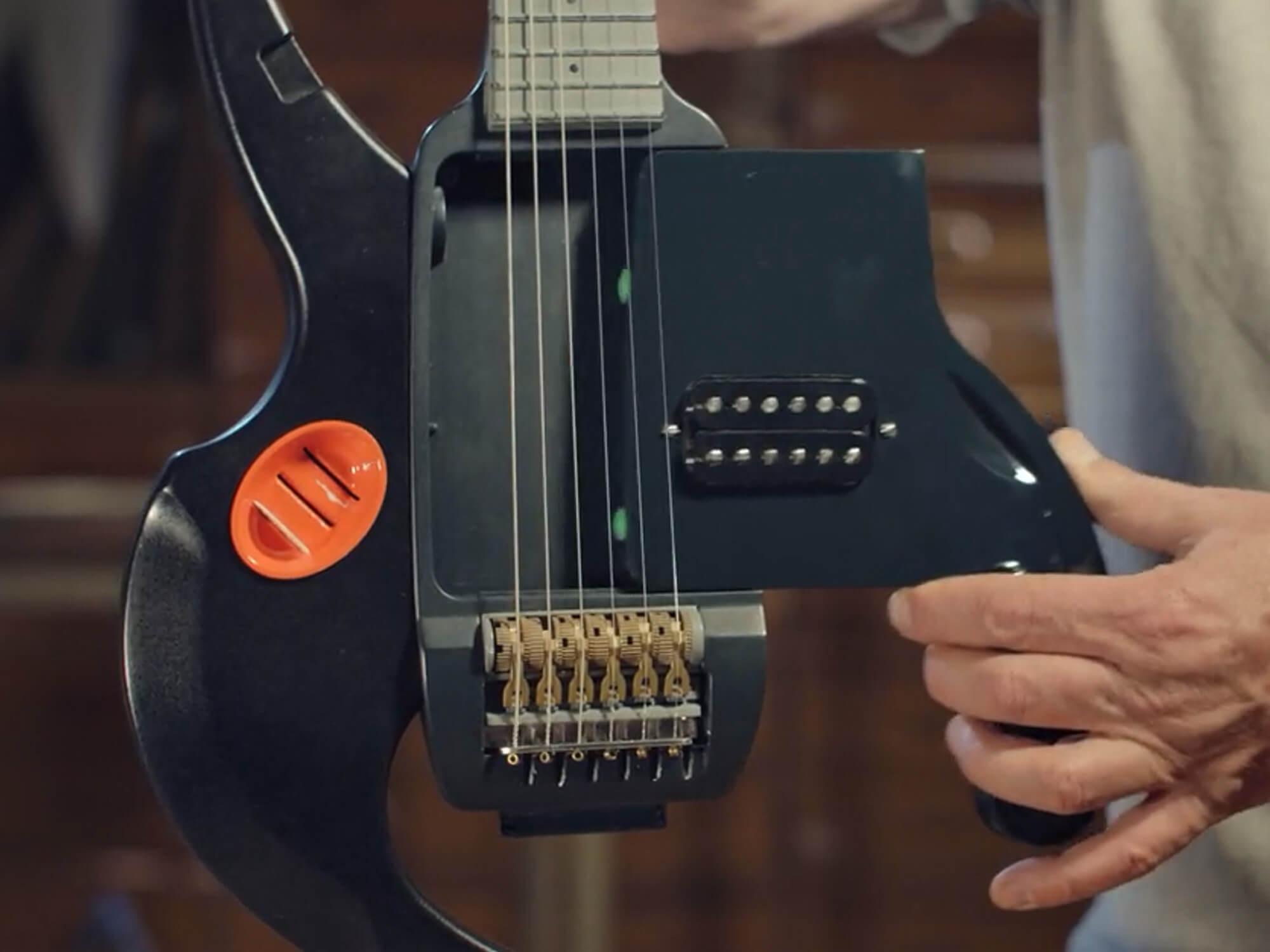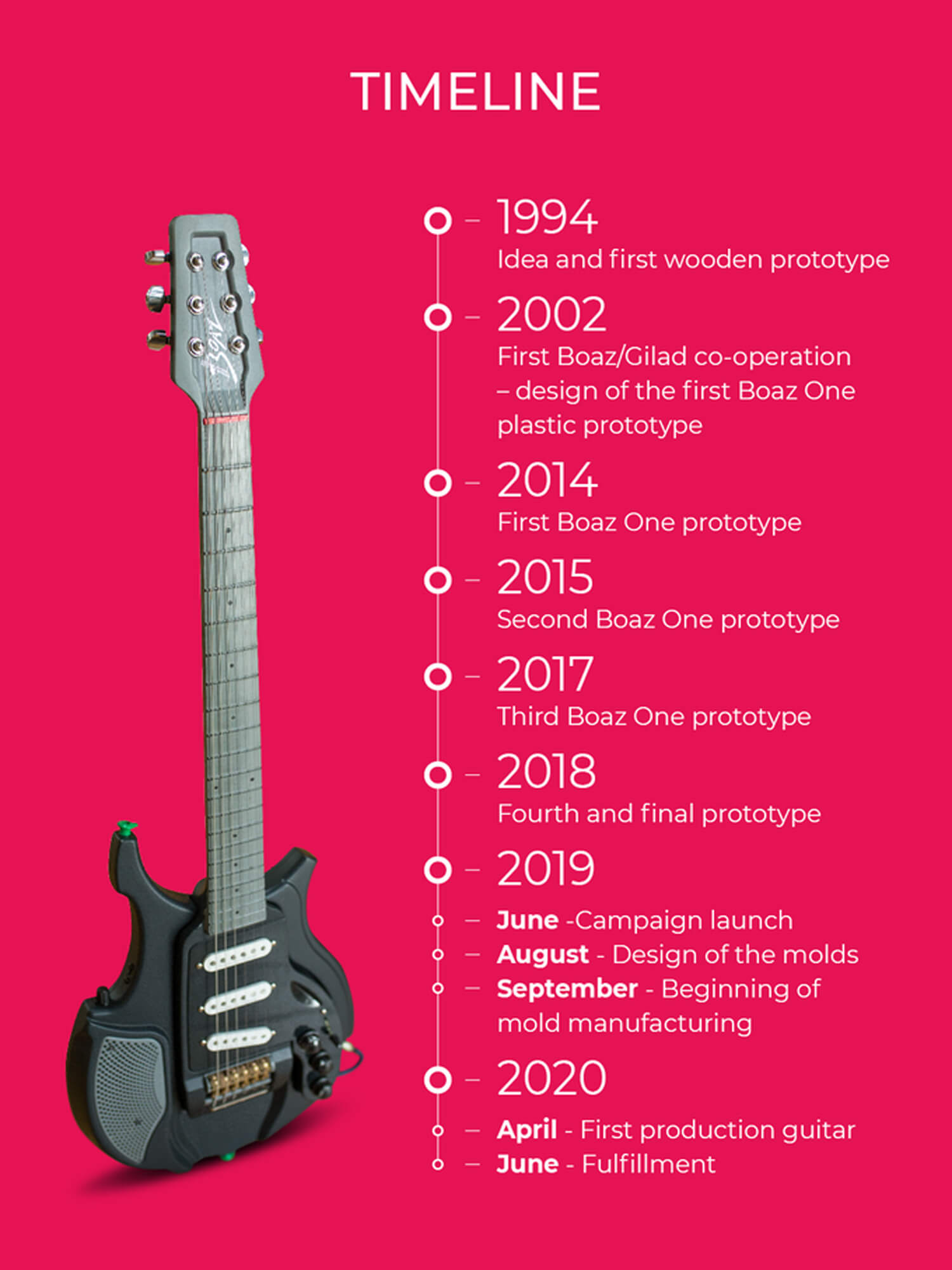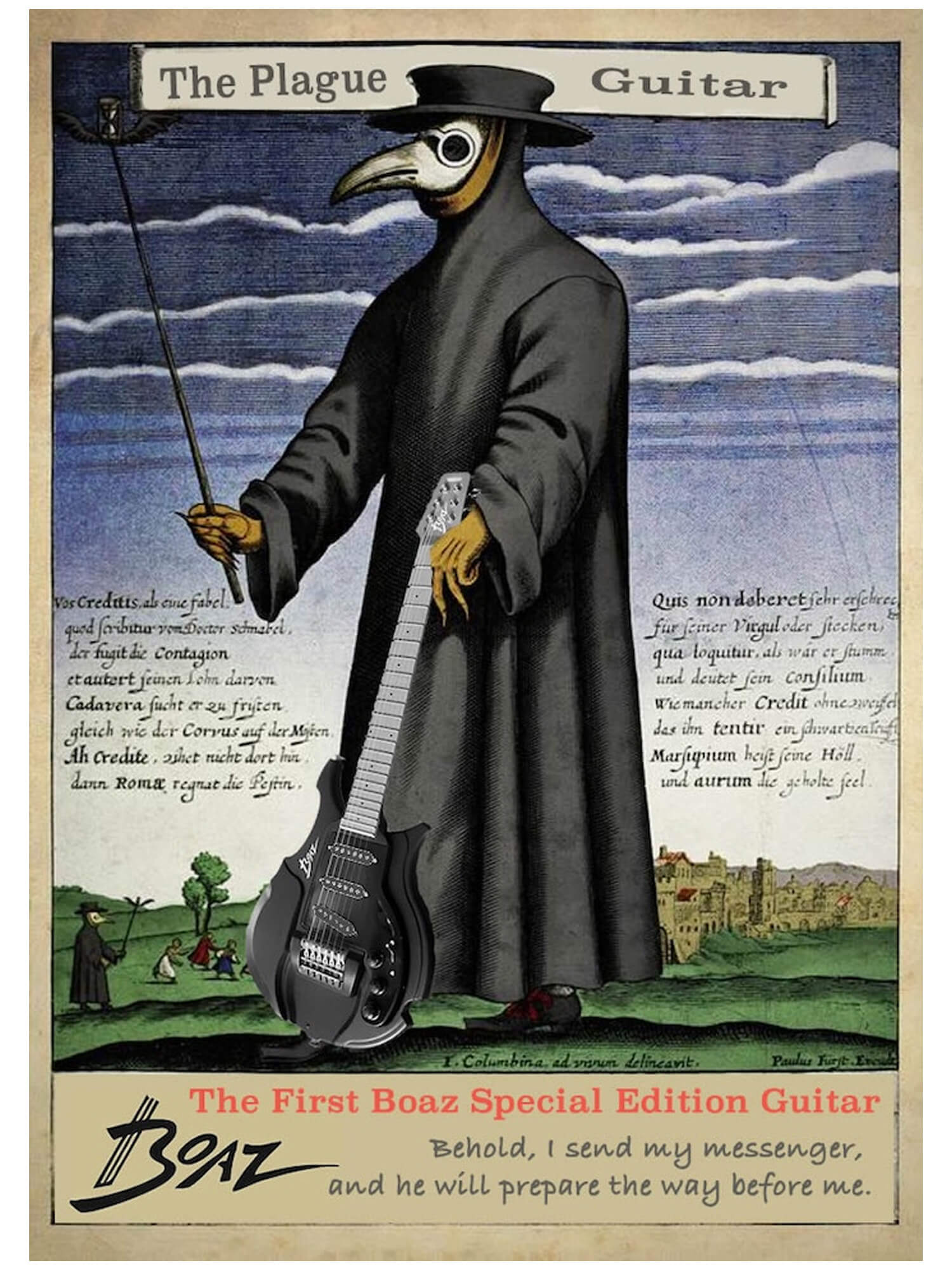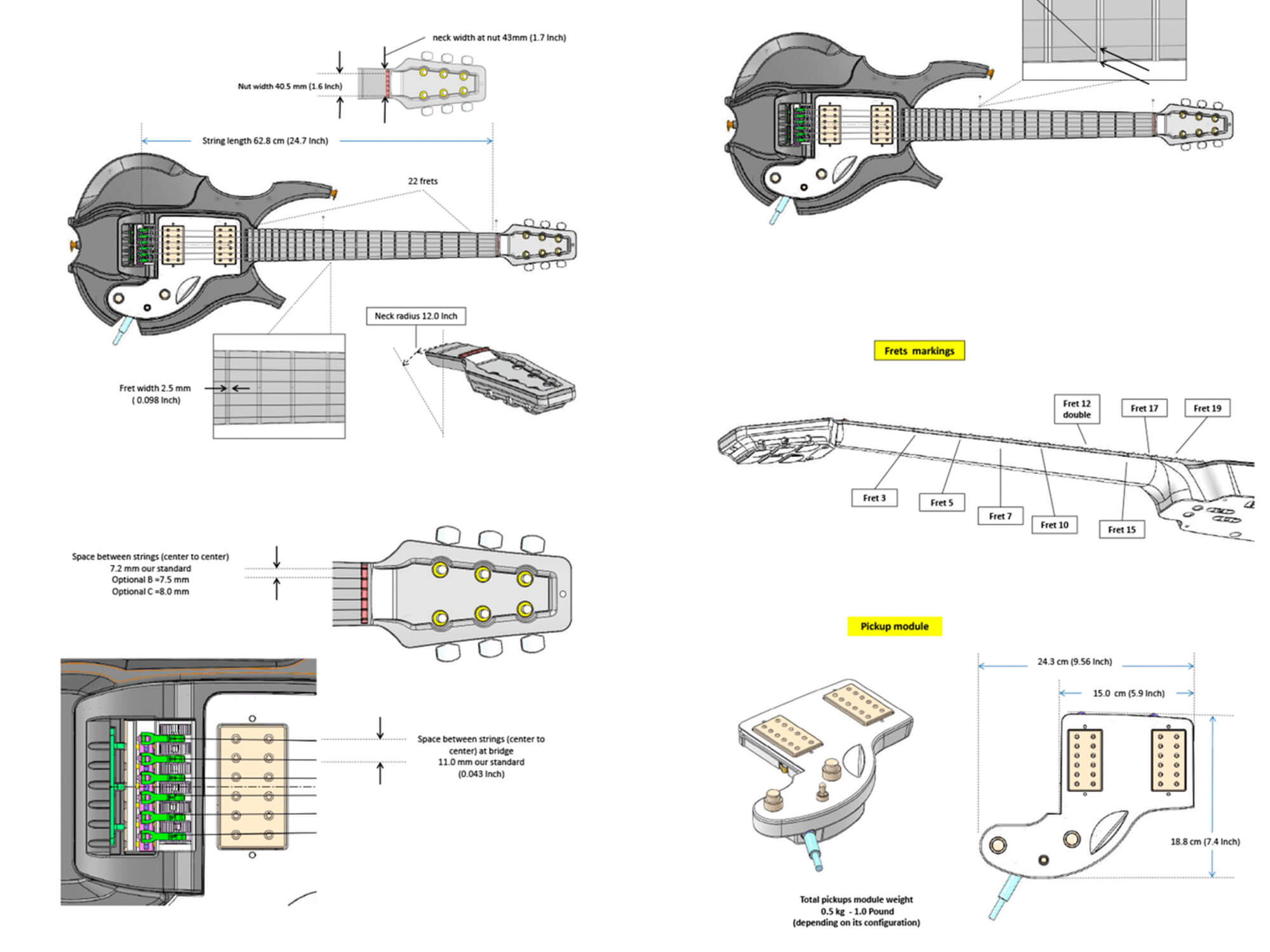Related Tags
The Boaz One modular guitar raised $450,000: three years on, no backer has one
The Boaz One seems to have Boaz Gone.

Image: Boaz ISI via Kickstarter
Do you remember the Boaz One? The conceptual modular guitar made waves back in 2019 when it smashed its $20,000 fundraising goal, raising over $450,000 across Kickstarter and Indiegogo – but in August 2022, no one who put money towards the campaign has received a guitar, despite an initial promise of a June 2020 delivery date. Furthermore, a second planned guitar from the same maker – a limited run of “pre-production prototypes” – has also gone AWOL too. So what happened? How did a project that broke its funding goal by more than 2,000 per cent seemingly evaporate into not one, but two pieces of vaporware?
The Boaz One is the brainchild of Boaz Elkayam, an Israeli luthier best known for his classical instruments. The concept goes back to the 1990s, but in the 2010s Elkayam’s company Boaz Innovative Stringed Instruments started work to bring the vision to life.
The guitar has two USPs: firstly, its design is modular, meaning you can quickly attach different body and pickup modules to the neck and bridge setup. Secondly, most of the guitar (the neck, body and even the frets) is made of a unique polycarbonate plastic – the full details of which Elkayam has kept under wraps. The Kickstarter page promises that this means there’s “no need for setups”, as “the durable plastic body of the Boaz One won’t change forms in varying conditions giving the plate a perfectly setup guitar at all times, saving you time and money!”
Almost 1,000 guitarists saw promise in the Boaz One. It raised $454,174 across its two crowdfunding campaigns, from a total of 908 backers. This smashed the goal of $20,000 by a huge margin – the total amount raised was 2271 per cent of the target. The Kickstarter campaign, which made up the vast majority of the funding, concluded on 28 September 2019.
Due to its modular nature, backers could choose between a range of packages, with various body and pickup modules offered in different combinations. For a single guitar, backers could pledge between $249 and $649, with the basic package coming with a single pickup module, an asymmetrical wing body and a bridge made of the unique plastic material. The premium package promised three pickup modules, a fuller body module and a brass bridge.
2020 Vision

Given that the Boaz One kickstarter concluded in September 2019, it was perhaps not surprising that the promised delivery date of June 2020 would be missed. Following the funding’s completion, Boaz Innovative Stringed Instruments began posting Kickstarter updates – written by team member Gordon Roberts. Some early updates informed backers of how the final design process was going, while others discussed more general topics. A CNC’d prototype arrived with Elkayam in January 2020, and in February, the team had CAD files ready to be turned into the moulds that would create the production guitars. A Kickstarter update from Gordon explained that “Although the guitars will be manufactured initially in Israel under Boaz’s supervision the moulds have to be made in China, there is simply no other economical option.”
However, as we’re now all too aware there might not have been a worse time to send designs off to begin manufacturing in China than February 2020. As soon as the scope of COVID-19’s impact on Chinese manufacturing became evident, an update on the Kickstarter page, written by Roberts, told backers: “I’m afraid that our goal of delivery in June may not be a realistic one anymore and every day that this crisis continues pushes our delivery date a little further out.” This was before COVID-19 was officially declared a global pandemic – but its potential impact on Chinese manufacturing was becoming clearer and clearer. The potential disruption to the Boaz One was huge: without moulds, guitars would need to be cut on a CNC machine, which wasn’t viable given the prices that the instruments were offered to backers at.
From then until summer 2020, updates charted the difficult process of getting the guitar’s moulds manufactured throughout global supply chain issues and varying levels of economic shutdown. The creation of the moulds was split into three stages to keep track of things:
- T1: The moulds are created, and sent to Boaz for approval and tweaks.
- T2: After these tweaks, the moulds are capable of creating functional instruments.
- T3: The final polishing and hardening has happened to the moulds, and they can now create the backer guitars.
The updates, despite the huge challenges, remained relatively optimistic. Titles of the updates include: “March is here and the Boaz One is progressing…”, “Another belated update but the news is all good!”, “Some more steady progress to report…”.
In August 2020, backers got some concrete good news: throughout all of the challenges, the Boaz One moulds were “very close to completion” – and testing could begin at “any moment.” But, here, things take a bit of a turn. We now come to the second guitar in the story: the Plague Guitar.
A Plague Tale

On 3 August 2020, an update stated that they expected to reach T1 in just a few weeks, but it also mulled over what to do with the guitars created in the T2 moulds. These would be “fully functional but cosmetically different” instruments, as all that needed to happen to the moulds was the final polishing and hardening. Once this was done, the guitars created would be T3s – the instruments the backers had put money down for.
Gordon posited that because of their rough look, they had their own appeal, and so they were thinking of selling them – separately to the T3 instruments.
“In honour of the time period that these guitars were born into we are going to call them The Plague Guitars. We are going to offer them exclusively to our backers at a reduced rate. […] Bear in mind, we are just floating this idea to see what the reaction will be in the Boaz Backer community. If you all decide this is just a money grubbing stunt to leverage more cash out of you all we will not do this.”
Evidently, that isn’t the conclusion that backers came to – at first. Later that month, a Kickstarter update revealed that: “On Wednesday 19 August [2020] we will offer you the opportunity to purchase one of the Boaz T2 Plague Guitars. We will email you a link that will initially only be available to you and the rest of our backers […] It’s first come, first served so you have been warned. There will be a limited amount of guitars available and they will be numbered and signed by Boaz himself.”
It was at this point backers voiced their frustration with the existence of the Plague Guitars. As Gordon explained in a 3 September Kickstarter update, “we began to get some pretty fierce negative reactions from some folks. Even though we had floated the idea for a week or so and solicited backer opinions in advance (which incidentally were 100 per cent positive) it seemed that we had totally misread the room. People complained about the price, the fact that they were perceived as junk guitars and on and on, someone even accused us of being scam artists and worse.”
It’s perhaps not hard to see why there was some pushback – the planned delivery date for the final guitars had passed just two months prior, and now, backers were being asked to pay $475 (or $525 if you were outside of the US) for “pre-production prototypes.” Those who bought another guitar would ostensibly get their additional instrument before those who had already helped Boaz guitars smash its fundraising goal.
And despite being more expensive than some of the backer reward guitars, all of which did come with pickups, the Plague guitar was planned to ship with no pickups at all – only a blank electronics module, into which you would install your own.
The pushback, Gordon writes, made Boaz guitars consider “pulling the plug” on the Plague Guitars. But the sales numbers were telling a different story to the angry comments. “We began to see the consistent uptick on the site as more and more of you signed up to buy your Plague Guitars. […] The money raised will speed up the delivery of your original backer guitars and believe me, you are going to own a true one of a kind instrument.”
Gordon’s departure

So we’ve got two different runs of instruments on the way from Boaz Innovative Stringed Instruments: the Boaz One, and the Plague Guitar. The Boaz One was first available to “purchase” in August 2019 through the Kickstarter campaign. The Plague Guitar was first available to purchase in August 2020.
Throughout all of 2021, COVID-19 related delays pushed things back, again and again. But finally, by February 2022, the parts for all of the ordered Plague Guitars were shipped to Boaz in Israel. Additionally, a 3 February update stated that “the moulds are being polished and hardened and as soon as this is complete, in a few weeks the Backer Guitar parts will also be on their way.” This would happen as soon as the factory reopened after Chinese New Year festivities.
So on 7 March, Gordon posted that the parts for the backer guitars should start being produced “any day now.”
And in May, Gordon posted that the backer parts were being delayed a little by another lockdown, but the good news was that: “The parts for the Plague Guitars are at Boaz’s workshop. The process of putting together the core of the instrument uses a fair amount of epoxy and part of what Boaz has been working out these last few weeks is which type of epoxy will work best in his particular production situation. […] The decision has been made and the epoxy has been ordered. We are now waiting for it to come in from the supplier and he will then begin production for real on the Plagues.”
This May update is the last activity on the Kickstarter page.
Let’s skip ahead to now, August 2022: neither run of guitars has materialised. Frustration among backers has reached a peak. None of them have any sign of a Boaz guitar, Plague or otherwise, almost three years down the line – and hundreds of dollars deep. Years of continuous posts about the mould manufacturing process had assured backers that great progress had been made – only for another issue to crop up a week later and push things even further back.
But it was on 8 July 2022 – two months after the last Kickstarter update – that backers truly became aware of the apparent dysfunction at the company. Gordon posted to the Facebook group created for backers, revealing that he had tried to inform Boaz of what Boaz Innovative Stringed Instruments needed to do “to become a viable company.”
“Some of these things were not what he wanted to hear but I felt it necessary to point them out, in my opinion the company was heading in the wrong direction,” Gordon wrote. “Boaz apparently disagreed and, instead of answering the email or calling me to discuss the contents, he gaslighted me.
“Weeks went by where he chose to neither answer my calls or my emails. Last week I discovered that my privileges on the various Boaz websites and social media pages had been revoked, including my access to the Kickstarter Page. It was becoming obvious what was happening. I had been pressing Boaz for years to come up with a partnership agreement between him, Gilad [Boaz ISI’s plastics expert] and myself but he kept putting it off. We have no formal agreement and Boaz always said I would have to come to Israel to do that. Apparently that is now off the table.
“Today I was informed by Boaz that my help is no longer needed. I have taken some legal advice and I am told it is time to completely step away from this situation. I am not an employee of this company and I never have been an employee of this company. I cannot answer any more questions concerning the way they choose to do business.”
Gordon then told backers to direct any further questions to Boaz’s email address. The overarching feeling in the comments was commiserating Gordon for having been kicked off the project, and thanking him for keeping them updated all the time. There was also, predictably, fury at what appeared to be the beginning of the end for any hope of them receiving a guitar.

It’s at this point that the Plague Guitars website was taken down, leaving those who wanted to retrieve the details of their order unable to do so. A day later, on 9 July there was a video update from Boaz himself – notably posted to a different Facebook group, one that had previously been dormant since March 2020, as the main group is managed by Gordon. In the video, Elkayam appears in front of piles of boxes, promising that guitar assembly will begin in the next few weeks.
Taking the “fun” out of “refund”
In August 2022, Guitar.com was contacted by a customer who had purchased both a backer guitar and a Plague Guitar. They were in direct contact with Elkayam, attempting to get some answers alongside either the guitars they purchased or a refund. Their communication with Elkayam ultimately raised more questions than it did answers.
On 16 July 2022, Elkayam told our source: “In six weeks I [will] start assembling the [backers’] guitars in batches of 50. At this very point I’m working on the assembling line, and hoping to finish it in [a] few weeks. I will keep everyone informed by a short video soon.” That’s two weeks from now, and so Elkayam could indeed stick to his word on that – but it raises the question: how come the Boaz Ones are ready to assemble? Weren’t the Plague Guitars meant to be made well before them? According to Elkayam: “At this point there is [a] dispute on the issue of the Plague Guitar because [Boaz Innovative Stringed Instruments] never got the money for the Plague Guitar.”
In Elkayam’s 9 July video, he states that “in the very soon future, a question of a few weeks, you’re gonna see guitars on the assembly line, starting with just a few, and it will grow and grow as we develop the technique.”
It was not clear whether he meant Boaz Ones or Plague Guitars, but he does state in the video that the boxes he is standing in front of contain “all the parts for the Plague Guitars, and a lot of parts for the backer guitars.” And, the last Kickstarter update had also stated that the Plague Guitar production was about to begin. Neither the Kickstarter update, nor Elkayam’s video, ever mentioned anything about not having received the money for the Plague Guitars.
Elkayam’s reply to our source continues. “Couple days ago when I talk to Brad The Guitologist he suggest to start sending the [backers] the guitar (The money from the [backers] we did get there is no issue there) that’s how the twist start, the [backers are going to get their guitars] first!! Until we solve the issue of the Plague Guitar with Gordon.”
It’s not clear what the involvement of Brad Linzy – aka popular guitar YouTuber ‘Brad The Guitologist’ – is in this project, or why he’s giving Elkayam guidance and advice about manufacturing and distribution.
Linzy has made several videos with Boaz and Gordon about the Boaz One since the project first appeared on Kickstarter but as far as Guitar.com can determine, there’s been no disclosure of any formal involvement in Boaz Innovative Stringed Instrument on Linzy’s part.
Another question this email poses is why Gordon is somehow preventing the company from accessing the funds for the Plague sales when he seemingly left the company a week before this email was sent. This is never made clear in communications with our source.
That email on 16 July is seemingly the last anyone has heard from Boaz Innovative Stringed Instruments or Elkayam – the source’s response posed various questions to Elkayam that remain unanswered, and the last public post from anyone at Boaz ISI is the 9 July video.
In that time, the mood among Boaz’s backers on the official Facebook group has become more frustrated and hostile. Guitar.com attempted to reach out to the group to see if any backers had similar stories to our source, however, our post was quickly declined by Gordon and upon attempting to post a second time we were temporarily banned from the group.
In addition, Guitar.com has reached out directly to both Elkayam and Roberts via email and neither has responded to our request for comment and clarification of the situation with Boaz ISI and the missing instruments.
Kickstart My Heart
The video updates that Elkayam promised in his 9 July video have so far not materialised, and both Boaz ISI’s social media channels and Kickstarter pages have gone dark. As far as we know, no backer has received a guitar despite years of reassurance and promises during the lengthy delays. Backers who purchased a separate additional guitar two years ago, which is still yet to appear, have tried to get just that additional $500 (or so) refunded, to no avail.
Exactly what Boaz Innovative Stringed Instruments’ obligations are for the backer guitars is somewhat opaque. Kickstarter’s terms of service are clear that the site is “not a store. When you back a project on Kickstarter, you’re helping create something new — not pre-ordering something that already exists.”
Boaz is expected by the site to “make every reasonable effort to find another way of bringing the project to a satisfying conclusion.” But, the legal protections for backers are a little less concrete.

Where things are different is in the case of the Plague Guitars. They were purchased outside of Kickstarter, and the wording from the Boaz ISI team was that the Plague Guitar was a “purchase,” not a “pledge.” Here, buyer protection in terms of refunds might be a little stronger – but whether Boaz ISI will be able to provide refunds given the recent communications from Elkayam is unclear. Some backers are also reporting that their banks aren’t refunding the purchase as it was too long ago to dispute.
The Kickstarter project was intended to create a situation where Boaz ISI would be able to produce instruments for general sale, but as things stand that seems like a long way off – what’s clear is that, over three years later, the Boaz One story isn’t over yet.
If you’re a backer and want to share your story with us, write to us at letters@guitar.com. And stay tuned to Guitar.com as this story develops.
